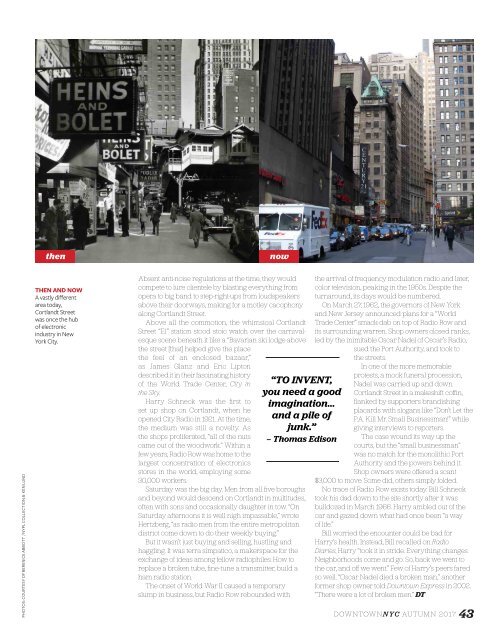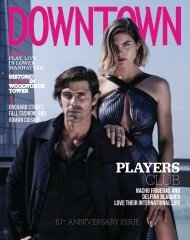Downtown Magazine Fall 2018 Issue
Downtown Magazine Fall 2018 Issue
Downtown Magazine Fall 2018 Issue
You also want an ePaper? Increase the reach of your titles
YUMPU automatically turns print PDFs into web optimized ePapers that Google loves.
then<br />
now<br />
PHOTOS: COURTESY OF BERENICE ABBOTT / NYPL COLLECTION & KEN LUND<br />
THEN AND NOW<br />
A vastly different<br />
area today,<br />
Cortlandt Street<br />
was once the hub<br />
of electronic<br />
industry in New<br />
York City.<br />
Absent anti-noise regulations at the time, they would<br />
compete to lure clientele by blasting everything from<br />
opera to big band to step-right-ups from loudspeakers<br />
above their doorways, making for a motley cacophony<br />
along Cortlandt Street.<br />
Above all the commotion, the whimsical Cortlandt<br />
Street “El” station stood stoic watch over the carnivalesque<br />
scene beneath it like a “Bavarian ski lodge above<br />
the street [that] helped give the place<br />
the feel of an enclosed bazaar,”<br />
as James Glanz and Eric Lipton<br />
described it in their fascinating history<br />
of the World Trade Center, City in<br />
the Sky.<br />
Harry Schneck was the first to<br />
set up shop on Cortlandt, when he<br />
opened City Radio in 1921. At the time,<br />
the medium was still a novelty. As<br />
the shops proliferated, “all of the nuts<br />
came out of the woodwork.” Within a<br />
few years, Radio Row was home to the<br />
largest concentration of electronics<br />
stores in the world, employing some<br />
30,000 workers.<br />
Saturday was the big day. Men from all five boroughs<br />
and beyond would descend on Cortlandt in multitudes,<br />
often with sons and occasionally daughter in tow. “On<br />
Saturday afternoons it is well nigh impassable,” wrote<br />
Hertzberg, “as radio men from the entire metropolitan<br />
district come down to do their weekly buying.”<br />
But it wasn’t just buying and selling, hustling and<br />
haggling. It was terra simpatico, a makerspace for the<br />
exchange of ideas among fellow radiophiles: How to<br />
replace a broken tube, fine-tune a transmitter, build a<br />
ham radio station.<br />
The onset of World War II caused a temporary<br />
slump in business, but Radio Row rebounded with<br />
“TO INVENT,<br />
you need a good<br />
imagination…<br />
and a pile of<br />
junk.”<br />
— Thomas Edison<br />
the arrival of frequency modulation radio and later,<br />
color television, peaking in the 1950s. Despite the<br />
turnaround, its days would be numbered.<br />
On March 27, 1962, the governors of New York<br />
and New Jersey announced plans for a “World<br />
Trade Center” smack-dab on top of Radio Row and<br />
its surrounding warren. Shop owners closed ranks,<br />
led by the inimitable Oscar Nadel of Oscar’s Radio,<br />
sued the Port Authority, and took to<br />
the streets.<br />
In one of the more memorable<br />
protests, a mock funeral procession,<br />
Nadel was carried up and down<br />
Cortlandt Street in a makeshift coffin,<br />
flanked by supporters brandishing<br />
placards with slogans like “Don’t Let the<br />
P.A. Kill Mr. Small Businessman!” while<br />
giving interviews to reporters.<br />
The case wound its way up the<br />
courts, but the “small businessman”<br />
was no match for the monolithic Port<br />
Authority and the powers behind it.<br />
Shop owners were offered a scant<br />
$3,000 to move. Some did, others simply folded.<br />
No trace of Radio Row exists today. Bill Schneck<br />
took his dad down to the site shortly after it was<br />
bulldozed in March 1966. Harry ambled out of the<br />
car and gazed down what had once been “a way<br />
of life.”<br />
Bill worried the encounter could be bad for<br />
Harry’s health. Instead, Bill recalled on Radio<br />
Diaries, Harry “took it in stride. Everything changes.<br />
Neighborhoods come and go. So, back we went to<br />
the car, and off we went.” Few of Harry’s peers fared<br />
so well. “Oscar Nadel died a broken man,” another<br />
former shop owner told <strong>Downtown</strong> Express in 2002.<br />
“There were a lot of broken men.” DT<br />
DOWNTOWNNYC AUTUMN 2017 43




